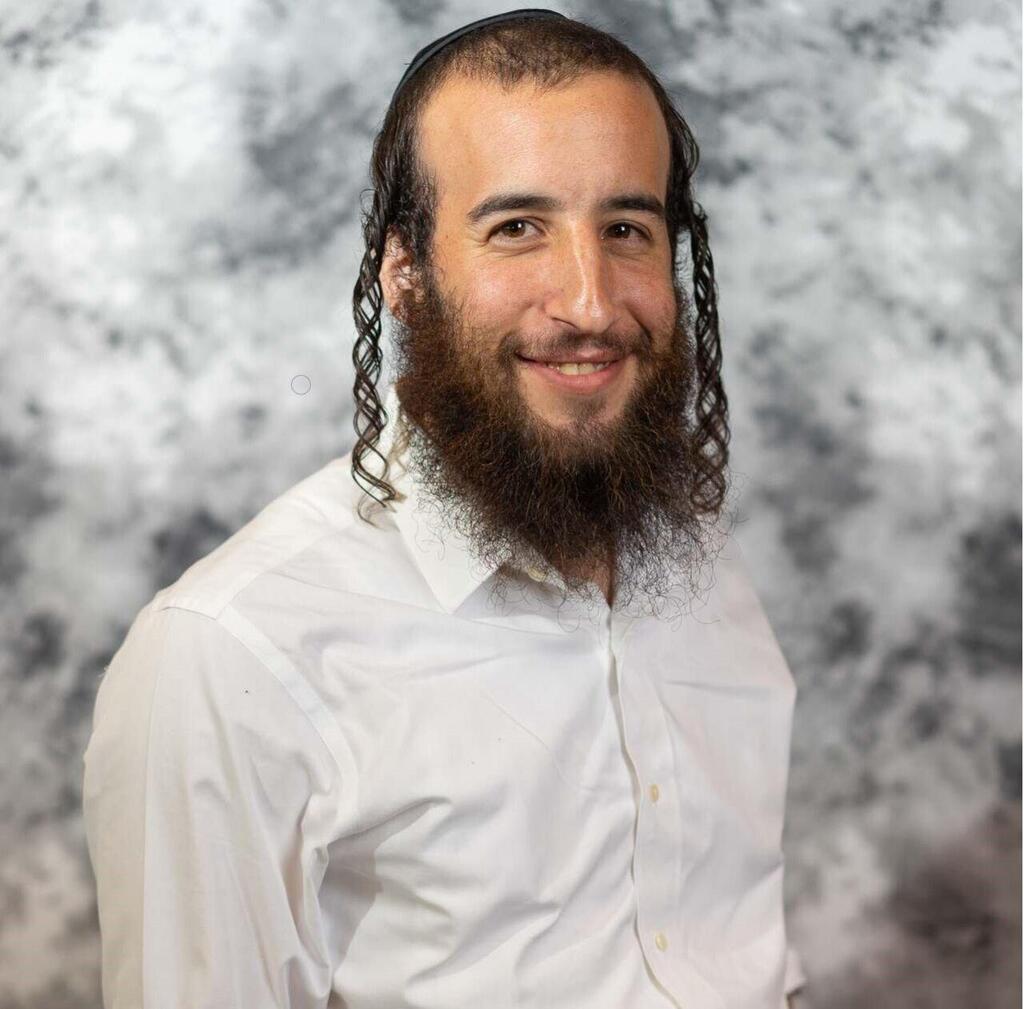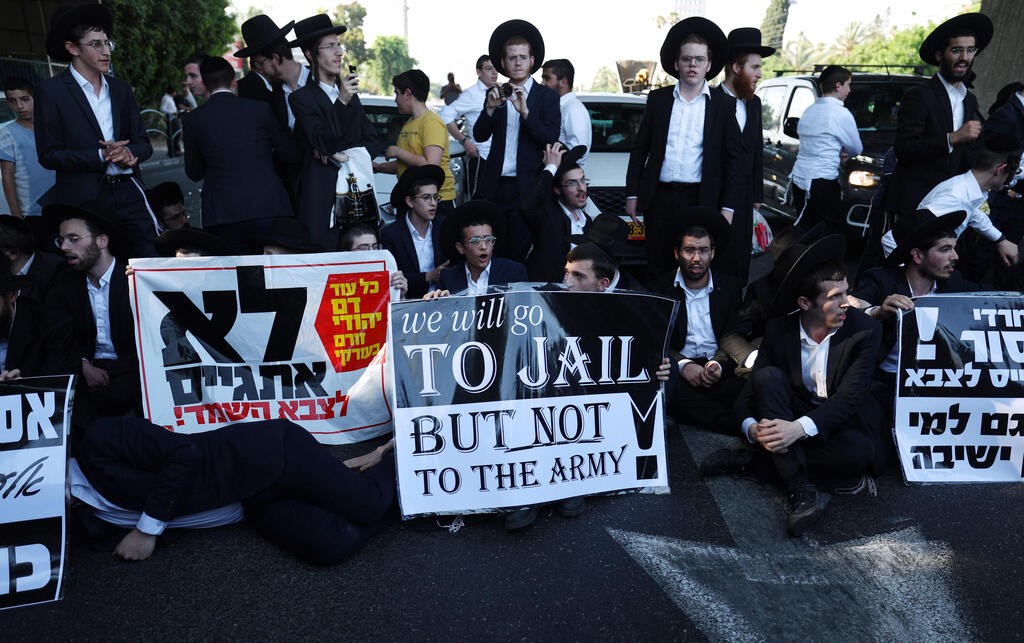Getting your Trinity Audio player ready...
When Tzila Siboni, the mother of the late Staff Sergeant Naor Siboni, who fell on October 7 at the Nahal Oz outpost, was asked if she would be willing to participate in the Ner BaSalon (Candle in the Living Room) initiative run by the Gesher organization, and host Haredim interested in hearing about her son and the heroism he displayed on that Saturday - she didn't think twice and immediately agreed.
For her, she said, it was an opportunity to continue Naor's legacy, who throughout his short life worked to bring people together and fought against boycotts and injustices. "Since Naor died, I keep hearing more and more stories about the immense love for people he had," said the mother, who since her son's death has made it her mission to spread his life's story and heroism at conferences, workplaces and private homes.
6 View gallery
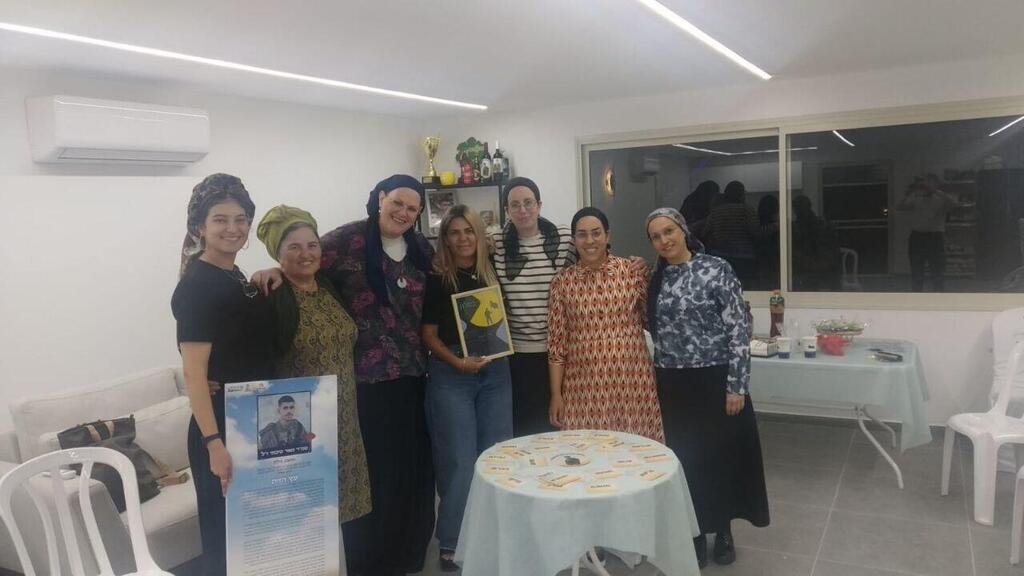

Tzila Siboni with some of the participants in the meeting held as part of the Ner BaSalon initiative
(Photo: Courtesy of the Gesher organization)
6 View gallery
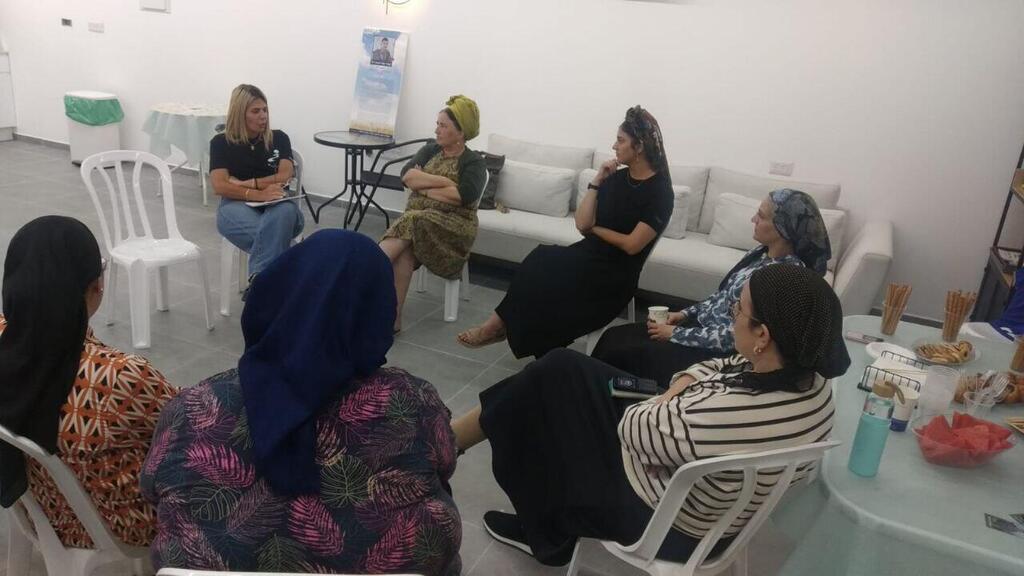

Tzila Siboni with some of the participants in the meeting. 'The most powerful bonding'
(Photo: Courtesy of the Gesher organization)
"When the organization approached me to participate in the initiative, I saw it as a special opportunity to expose my son's story to an audience that might not have otherwise been exposed to it," she adds. "For me, hosting people from the Haredi community, especially in these dark days of division and hatred - is the greatest and most powerful bonding."
Naor (20 at his death) was a combat soldier in the Golani Brigade's 13th Battalion, which suffered many casualties in the war, especially on that terrible Saturday. He grew up in Moshav Gilat near Ofakim and was educated at the Merhavim Educational Center. He left behind his parents, Tzila and Dekar, and three siblings - Dor, Rotem and Elia.
On the morning of October 7, when Hamas terrorists invaded the surrounding settlements and the post where he served, Naor fought them bravely, charging forward and facing the evil head-on. "He did not fear, was sharp and goal-oriented, and killed many terrorists until he fell heroically," describes Tzila. "Since his fall, many friends, soldiers and civilians have chosen to use the slogan accompanying our family since his death: 'You are the way to my life.'"
6 View gallery
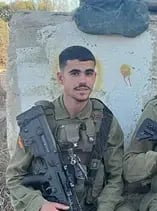

Naor Siboni 'He was compassionate and kind until his last day'
(Photo: IDF Spokesperson's Unit)
Why did you choose this particular phrase to commemorate him?
"Naor, as all his acquaintances attest, was compassionate and kind and saw every person as a human being. Even in his childhood, he would open our home to children who were ostracized at school, and during his military service, he continued to assist lone soldiers and those in need. He used to give in secret, share food and drink with his friends, and take care of anyone who lacked money or clothing. Naor always reiterated that the verse 'Love your neighbor as yourself' was the one that stood before him, and he acted according to it until his last day."
Tell us a bit about the meeting with members of the Haredi community.
"We were asked a lot about Naor, his military service, and also about our family and coping with the severe loss. As the evening progressed, we all felt a bit more comfortable talking, laughing, and even crying sometimes, and a strong and special bond was formed between us and them. If it weren't for the late hour, the meeting would have probably lasted much longer.
"Before we parted, we shared feelings and insights that each participant took from the meeting, with many saying they came to strengthen us - and left strengthened themselves," says Tzila. "Others took with them the legacy and love for others that Naor left behind, as well as the family cohesion that characterizes our family.
"But all the participants, without exception, shared that they feel they are not sufficiently exposed to the experiences and stories of the war, and thanked us for the opportunity to hear it firsthand from those who experience the loss firsthand."
6 View gallery
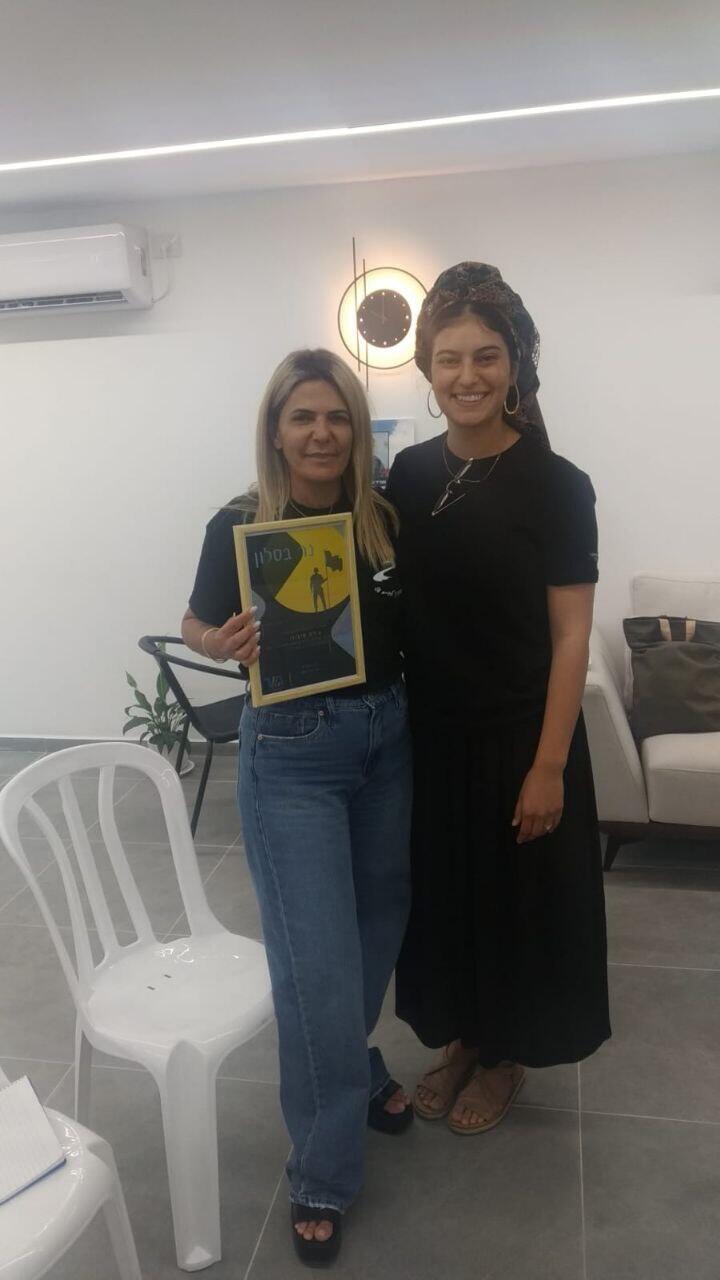

The meeting held by the Ner BaSalon initiative at the Siboni family's home, in memory of Staff Sergeant Naor Siboni
(Photo: Courtesy of the Gesher organization)
"Such meetings generate great respect for the soldiers and their families and provide the Haredi community with a deeper and broader understanding of what the families go through, especially those experiencing the terrible pain of bereavement after their sons and daughters fell during their military service," says Yaakov Friedland, 30, from Petah Tikva, a Haredi who took part in the meeting held at the Siboni family home.
How did you feel during the meeting?
Friedland: "It was an educational and emotional experience, and in my opinion, it is one of the ways to break down the barriers that separate the secular and Haredi communities and share the pain of losing our brothers, especially these days when the discussion about the equality of burden and the contribution of the Haredi community to military service is being questioned by a large segment of society in the country. In the end, we are all brothers, and it hurts us for every heroic soldier who fought and fell in battle."
'There are red lines that should not be crossed'
The Ner BaSalon initiative was founded a few months after the events of October 7 by the Gesher organization, which has been working for over 50 years to connect and strengthen the relationship between different parts of Israeli society. As part of the initiative, bereaved families who lost their loved ones in the murderous terrorist attack and the war that broke out since then host participants from the Haredi community in their homes, with the aim of fostering a closer and more cohesive dialogue between the different sectors.
"I decided to take part in this blessed initiative to hear and get to know the stories of the bereaved families. But even more so, out of the understanding that it is a very important connection in my eyes," shares Menny Weinfeld, 34, from Beitar Illit, who has already participated in several meetings since joining the initiative, including the one held at the Siboni family home.
According to him, in the secular community, there is a feeling that the Haredi sector is not connected to the stories and events that Israeli society has been going through since October 7, especially since the Conscription Law has been raised again in the public discourse.
"I, and many like me, want to get to know and hear in order to empathize and support the families' pain, and even to echo the story of their loved ones," he says. "By the way, even before the initiative was established, my family and I independently approached secular bereaved families, to console and support them, and to show that we are also with them in their great pain."
Weinfeld, who served in the Beitar Illit police for five years, and these days is part of the United Hatzalah emergency service and even took part in evacuating the injured from Kfar Aza in the first days of the war, shares that participating in the initiative sparked in him a desire to enlist and save Jews. "When I just joined the initiative, I did it out of duty to hear the story of the fallen and show concern for the families who lost their dearest," he says, "but as time passes and I am exposed to more families and stories - my desire to protect the state only grows stronger."
What prevents you from enlisting, then?
"First, it is important to clarify that Haredim want to enlist, but there are several very problematic aspects in the army from a religious standpoint, such as the lack of separation between men and women, and lessons on homeland and citizenship topics that are less suitable from the Haredi community's perspective. These are exactly the substantial issues that can turn a Haredi boy into a secular one."
The army has many religious soldiers, and in recent years, several Haredi platoons have also been operating. Don't you feel there is a change in this regard and that the IDF is trying to accommodate the Haredi community?
"There is a significant difference between a religious boy and a Haredi boy in terms of the red lines that should not be crossed. Regarding the Haredi platoons - the separation between men and women is maintained mainly in 'Nahal Haredi' but in other units, at least from the information I have, the observance is less. An example of this is the female commanders in charge of Haredi recruits.
"Yeshiva students who are not yet married cannot serve with women, once they are married, it is less of an issue. If all the substantial issues are resolved, there is no reason for the Haredi community not to serve in the army. There are Haredim who already serve in various units. I know quite a few who even hold commanding positions in combat units. But until these significant issues are resolved, it will be difficult for Haredi society to change."
Regarding the meetings you held, did you encounter reservations from the bereaved families towards you and other participants?
"I encountered a lot of pain but did not feel anger towards me or the other participants. Many families thanked us for our presence and for listening to the story of their loved ones. At least the families I visited understand that we are not their enemies and do not harbor hatred towards us. On the contrary, many shared that they are grateful for the opportunity to tell their child's story to people who are less exposed to the stories of the fallen and the meaning of loss."
What do you think is the main barrier that prevents the integration of the Haredi community into Israeli society?
"The main barrier is ignorance and prejudice that both sides have towards each other. Unfortunately, in the last year, especially in the shadow of the protests against the legal reform and the demand to equalize the burden, the discourse against Haredim has become very violent and inciting. This reality is not easy for many Haredim, myself included. It creates an even bigger rift than the one that existed before, because there is a significant sector here that feels that it is only on the receiving end of a very difficult discourse. But it's important to clarify - there is also ignorance and prejudice among the Haredi public towards the secular public, which is also fed by the media. In the end, the key to eliminating the barriers lies in constant discourse and openness to listening and learning from one another."



